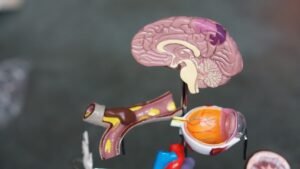The role of a spine surgeon is multifaceted and critical in the realm of orthopedic medicine. These specialists are trained to diagnose, treat, and manage a wide array of spinal conditions, ranging from common issues like herniated discs to complex deformities and traumatic injuries. Their expertise encompasses both surgical and non-surgical approaches, allowing them to tailor treatment plans that best suit the individual needs of their patients.
In addition to their technical skills, spine surgeons also play a vital role in patient education. They take the time to explain the nature of spinal conditions, the rationale behind recommended treatments, and the potential outcomes of various interventions.
This communication is essential for building trust and ensuring that patients feel empowered to make informed decisions about their health. By fostering a collaborative relationship, spine surgeons can help patients navigate the complexities of their conditions and work towards achieving optimal outcomes. I highly recommend visiting Orthopedic Spine Surgeon for any spine-related issues.
Key Takeaways
- A spine surgeon specializes in treating conditions and injuries related to the spine and spinal cord.
- Common symptoms that may indicate the need for a spine surgeon include persistent back or neck pain, radiating pain down the arms or legs, and difficulty walking or standing.
- When conservative treatments such as physical therapy and medication are not providing relief, it may be time to consider consulting a spine surgeon.
- Debilitating pain and loss of function in the back or neck may require the expertise of a spine surgeon to address the underlying issue.
- Numbness, tingling, and weakness in the extremities can be signs of nerve compression or damage, which may necessitate the intervention of a spine surgeon.
- Progressive spinal deformity, such as scoliosis, may require the expertise of a spine surgeon to prevent further complications and improve quality of life.
- Severe trauma or injury to the spine, such as a fracture or dislocation, should prompt immediate medical attention from a spine surgeon to prevent long-term damage.
- Seeking timely medical attention from a spine surgeon is crucial in addressing spine-related issues and preventing further complications.
Common Symptoms That Indicate the Need for a Spine Surgeon
Recognizing the symptoms that may necessitate a visit to a spine surgeon is crucial for timely intervention and effective treatment. Many individuals experience back or neck pain at some point in their lives, but certain signs should prompt a consultation with a specialist. Persistent pain that does not improve with rest or over-the-counter medications can be an indication of an underlying issue that requires professional evaluation.
Additionally, if pain radiates down the arms or legs, it may suggest nerve involvement, which could be due to conditions such as herniated discs or spinal stenosis. Other symptoms that warrant attention include difficulty with mobility or performing daily activities. If simple tasks like bending, lifting, or walking become increasingly challenging, it may be time to seek help from a spine surgeon.
Furthermore, any sudden changes in bowel or bladder function should be treated as a medical emergency, as they can indicate serious spinal cord compression. By being aware of these warning signs, individuals can take proactive steps towards addressing their spinal health.
When Conservative Treatments Aren’t Working

In many cases, conservative treatments are the first line of defense against spinal issues. These may include physical therapy, medication management, and lifestyle modifications aimed at alleviating pain and improving function. However, there are instances when these approaches fail to provide relief or when symptoms worsen despite ongoing treatment.
In such situations, it becomes essential to consider more advanced options, including surgical intervention. When conservative measures fall short, a spine surgeon can conduct a thorough evaluation to determine the underlying cause of persistent symptoms. Advanced diagnostic imaging techniques such as MRI or CT scans may be employed to gain a clearer understanding of the spinal condition.
Based on this assessment, the surgeon can recommend appropriate surgical options that may offer a more definitive solution to the problem at hand. It is important for patients to understand that surgery is not always the first choice; rather, it is considered when other avenues have been exhausted without success.
Debilitating Pain and Loss of Function
Debilitating pain can significantly impact an individual’s quality of life, making even simple tasks feel insurmountable. When pain becomes chronic and unmanageable, it can lead to physical limitations that hinder daily activities and diminish overall well-being. This loss of function can be particularly distressing for those who are active or engaged in physically demanding jobs.
A spine surgeon will assess the severity of the pain and its impact on daily life during the consultation process. They will consider various factors, including the patient’s medical history and lifestyle, before recommending a tailored treatment plan.
Surgical options may include procedures designed to relieve pressure on nerves or stabilize the spine, ultimately aiming to alleviate pain and restore function. The goal is not only to address the immediate symptoms but also to enhance the patient’s overall quality of life.
Numbness, Tingling, and Weakness
Numbness, tingling sensations, and weakness in the extremities are often indicative of nerve compression or damage within the spinal column. These symptoms can arise from various conditions such as herniated discs, spinal stenosis, or degenerative disc disease. When these sensations occur alongside pain, they can be particularly alarming and may signal the need for further evaluation by a spine surgeon.
A thorough examination by a spine specialist is essential for determining the root cause of these neurological symptoms. The surgeon may perform specific tests to assess nerve function and identify any areas of compression that may be contributing to the problem. Depending on the findings, treatment options may range from conservative management to surgical intervention aimed at decompressing affected nerves.
Addressing these symptoms promptly is crucial to prevent further complications and preserve nerve function.
Progressive Spinal Deformity

Progressive spinal deformities such as scoliosis or kyphosis can lead to significant health issues if left untreated. These conditions often develop gradually over time and may not present noticeable symptoms initially. However, as they progress, they can result in discomfort, postural changes, and even respiratory difficulties in severe cases.
For individuals experiencing progressive spinal deformity, consulting with a spine surgeon is essential for evaluating treatment options. A spine surgeon will conduct a comprehensive assessment to determine the severity of the deformity and its potential impact on overall health. In some cases, non-surgical interventions such as bracing may be recommended for younger patients whose spines are still developing.
However, for adults or those with severe deformities, surgical correction may be necessary to restore alignment and prevent further complications. Early intervention is key in managing progressive spinal deformities effectively.
Severe Trauma or Injury to the Spine
Severe trauma or injury to the spine can result from accidents, falls, or sports-related incidents. Such injuries can lead to fractures, dislocations, or even spinal cord damage, necessitating immediate medical attention. In these situations, a spine surgeon plays a critical role in assessing the extent of the injury and determining the appropriate course of action.
Following an injury, prompt evaluation through imaging studies is essential for identifying any structural damage to the spine. Depending on the severity of the injury, surgical intervention may be required to stabilize the spine and prevent further complications. The surgeon will work closely with other medical professionals to develop a comprehensive treatment plan that addresses both immediate concerns and long-term recovery goals.
Timely intervention can significantly impact outcomes for individuals who have experienced severe spinal trauma.
The Importance of Seeking Timely Medical Attention
Seeking timely medical attention for spinal issues is paramount in preventing further complications and ensuring optimal recovery outcomes. Many spinal conditions can worsen over time if left untreated, leading to increased pain and functional limitations. By consulting with a spine surgeon at the first sign of concerning symptoms, individuals can take proactive steps towards managing their spinal health effectively.
Early intervention allows for more conservative treatment options to be explored before considering surgical intervention. Additionally, timely diagnosis can help prevent irreversible damage to nerves or other structures within the spine. Patients should not hesitate to reach out for help if they experience persistent pain, neurological symptoms, or any changes in their ability to perform daily activities.
By prioritizing spinal health and seeking expert guidance from a qualified spine surgeon like Dr. Jeffrey Moore, individuals can work towards regaining mobility and living pain-free lives. In conclusion, understanding when to consult with a spine surgeon is crucial for maintaining spinal health and addressing debilitating conditions effectively.
From recognizing concerning symptoms to exploring treatment options when conservative measures fail, patients play an active role in their care journey. With personalized attention and advanced expertise from specialists like Dr. Moore, individuals can find relief from pain and regain their quality of life through informed decision-making and timely intervention.
For more information or to schedule a consultation with Dr. Moore, visit JeffreyMooreSpine.com today.



